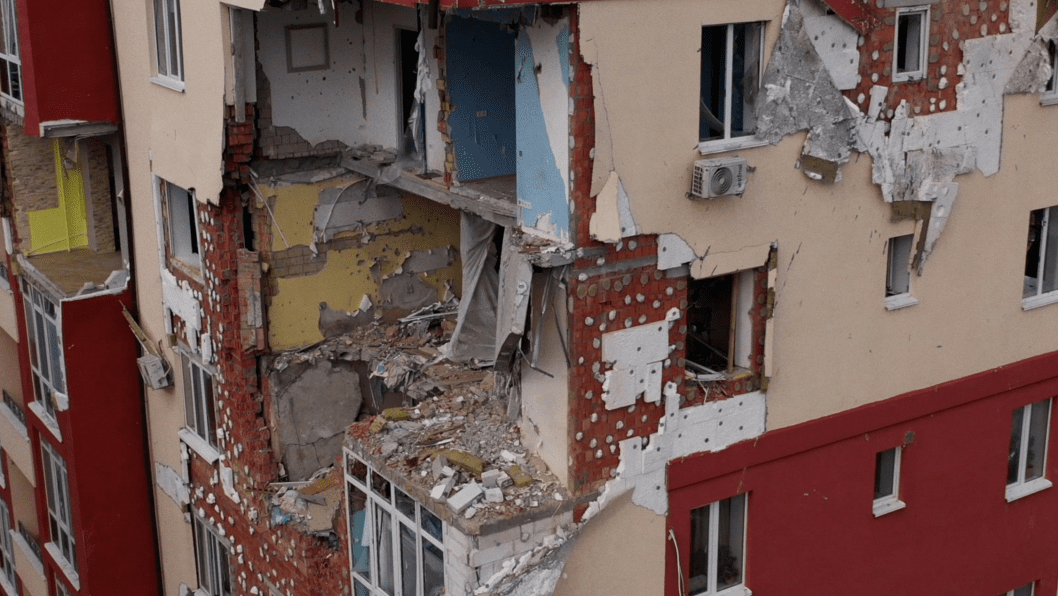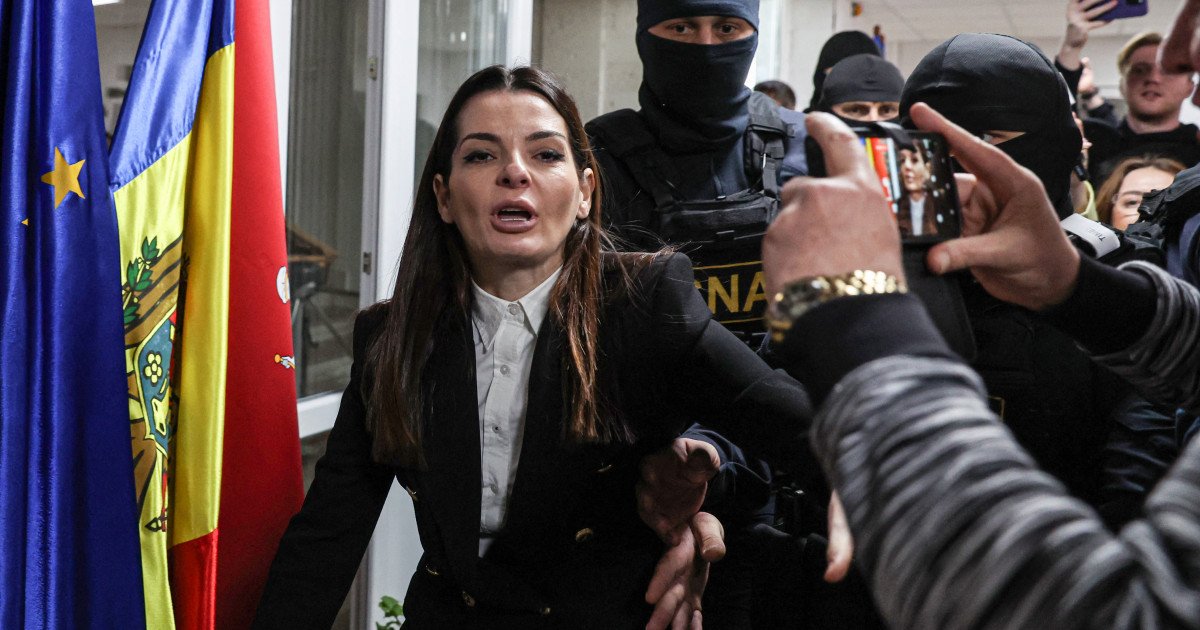A pro-Kremlin regional leader has been jailed in Moldova, marking a major blow to Kremlin influence in the country’s autonomous south. As Chișinău deepens ties with the EU and Ukraine, Russia’s decades-long grip continues to unravel.
Updated Aug 05, 2025 19:16
6 min read
Authors
On August 5, a court in Chișinău sentenced the head of Moldova’s autonomous Gagauzia region, Evghenia Guțul, to seven years in prison for funnelling Russian money to the banned Șor Party. This marked a major blow to Moscow’s influence in Moldova.
Svetlana Popan, the Șor Party’s former secretary, was also convicted in the case and sentenced to six years in prison.

Gagauzia leader Evghenia Guțul escorted by Moldova’s anti-corruption police at the Chisinau court, March 28, 2025. (Source: Getty Images)
In response, Russia claimed that Moldova’s pro-European government is “repressing dissent,” charging Guțul with “cooked-up charges” due to “pressure on judges.”
“All those involved in corruption schemes must face justice,” Moldovan Parliament Speaker Igor Grosu said.
The Kremlin regime, which persecutes the opposition and kills inconvenient politicians, is not in a position to offer lessons on democracy.
Deputy Prime Minister and Minister of Foreign Affairs of Moldova
Who is Evghenia Guțul?
Evghenia Guțul is seen by prosecutors, Western officials, and analysts as a Kremlin-linked political actor. Sanctioned, tried, and now jailed, her arrest has become a symbol of Moldova’s push to dismantle Moscow’s influence in Moldova.
Guțul initially rose to power as the Șhor Party candidate. At the time, the party was accused of buying voters.

Moldovan politician and Gagauzia’s Governor Evghenia Guțul speaks prior the plenary session of the 2024 Saint Petersburg International Economic Forum SPIEF’24, June 7, 2024, in Saint Petersburg, Russia. Vladimir Putin arrived to Saint Petersburg with a three-days trip to attend an annual Economic Forum. (Photo by Contributor/Getty Images)
Guțul was found to funnel undeclared Russian funds into Moldova from 2019 to 2022 to finance the now-banned pro-Russian Șor Party. The party was founded by Ilan Șor, a pro-Russian businessman convicted of orchestrating a $1 billion bank theft, now living in exile in Moscow. Șor fled Moldova to evade corruption charges, and he was sentenced in absentia to 15 years’ imprisonment and ordered confiscation of $290 million in assets.
Moldova’s authorities banned the Șor Party in June 2023, citing threats to national sovereignty and democratic norms.
Guțul was elected in 2023 as governor (bashkan) of Gagauzia, Moldova’s ethnic Turkic autonomous region—widely considered a pro‑Russian stronghold. In March 2024, she met with Russian leader Vladimir Putin, which was seen as part of Kremlin-backed networking.

Russian leader Vladimir Putin and Evghenia Guțul. Source: Kremlin.ru/archive
The EU and the US sanctioned Guțul in late 2024 for “attempting to overthrow the constitutional order” and “destabilizing the Republic of Moldova.”
During her time as leader, she has strongly criticised Moldova’s current pro-European government and regularly visited the Kremlin’s top officials. Guțul was detained in March 2025 at Chișinău airport on suspicion of electoral fraud and sought support for her case from Putin. She was first placed in jail, but later moved to house arrest amid protests from Gagauzia residents and Kremlin officials.
Prosecutors say that Guțul “was actively involved in … the systematic introduction of unaccounted financial means to Moldova, coming from an organised criminal group, mainly from the Russian Federation” of more than $2.4 million. Guțul was also found to be “responsible for remunerating participants in anti-government protests organised by the Șor Party in Chișinău.”
The Kremlin criticized the ruling, linking it to Moldova’s upcoming elections in September.
Russia’s grip on Moldova
Russia has long used hybrid warfare. Not just tanks and troops, but disinformation, proxy politicians, and frozen conflicts—to maintain influence in European countries. Moldova is a prime example.
Moscow continues to exploit its footholds in both Transnistria and Gagauzia, using them as strategic levers to destabilize Moldova’s pro-European course.
In the temporarily occupied territories of Moldova, a brave man humiliates the Russian occupiers. pic.twitter.com/eS00w2v59U
— WarTranslated (@wartranslated) September 26, 2024
After a brief Russian-backed war in 1992, Transnistria, an eastern Moldovan region that borders Ukraine, declared independence and is still controlled by an estimated 1,500 Russian troops.
During the collapse of the Soviet Union in 1990, Gagauzia declared independence, and in 1994, Moldova granted the region independence. Since then, using pro-Russian politicians like Șor and Guțul, Moscow has continued to maintain some level of influence in the region.
Moldova’s EU push
Pro-European Maia Sandu became President of Moldova in 2020. And in 2022, Moldova was granted EU Candidate status, prompting Russia to begin waging its aggressive anti-Western campaign.
Ukrainian President Volodymyr Zelenskyy confirmed in 2023 that Ukraine had “intercepted the plan of the destruction of Moldova by the Russian intelligence” to “break the democracy of Moldova and establish control over Moldova,” American news agency AP reported.
Russia was planning to use “saboteurs with military background, camouflaged in civilian clothes, to undertake violent actions, attacks on state institutions, and taking hostages,” Sandu said.

President of Moldova Maia Sandu (L) and Ursula von der Leyen (R), President of the European Commission attend a press conference at the and of EU-Moldova Summit in Chisinau July 4, 2025. (Photo by Elena COVALENCO / AFP via Getty Images)
The Kremlin’s disinformation campaign
In 2023, a wide range of celebrities, from Lindsay Lohan to Brian Baumgartner, were caught up in a propaganda campaign targeting Sandu. A badly generated AI video was posted on TikTok, allegedly showing several celebrities calling for the overthrow of Sandu.
After the Șor Party was banned in Moldova, Ilan Șor launched his new “Victory” political bloc in Moldova in April 2024. From the stage of a hotel in Moscow, Șor stated that his bloc will campaign to get closer to Russia and abandon its European path, Balkan Insight reported.
“Sandu is deliberately breaking the umbilical cord of our ties with the CIS, with Russia … our traditional partners and neighbours,” said Ilan Șor.
Moldova has barred the pro-Russian “Pobeda” (Victory) bloc, led by Ilan Shor, from participating in the upcoming parliamentary elections. Shor is under sanctions imposed by the United States, the European Union and Ukraine. He also fled to Moscow
The country’s Central Election… pic.twitter.com/22uhvhMGMp
— Special Kherson Cat 🐈🇺🇦 (@bayraktar_1love) July 19, 2025
As Sandu moves Moldova closer to the EU and Ukraine, Russian disinformation—especially targeting Moldovan communities across Europe—is ramping up ahead of the country’s pivotal September 2025 elections. The Diaspora played a decisive role in the previous presidential election, so now the Kremlin is focusing on overseas voters, the Centre for Countering Disinformation (CCD) said.
In 2025, pro-Russian bots launched a campaign to drive a wedge between Sandu and European Commission Vice-President Kaja Kallas. A fake article falsely claiming Chișinău Mayor Ion Ceban accused Sandu of embezzling $2.6 million in USAID was widely shared in May 2025 across Russia’s propaganda networks.
Cracks in Moscow’s hold
The imprisonment of Guțul, a central figure in the Kremlin-linked Moldovan network, will serve as a powerful blow to Russia’s foothold in the region. Likely, Russia’s disinformation and propaganda campaign will only ramp up to combat this strategic loss.
Despite relentless efforts by the Kremlin to destabilize Moldova through political interference, economic pressure, and disinformation, Chișinău continues to stand firm, pushing for further integration with the EU and NATO.
Related articles

Donate Towards The Reconstruction of Residential Buildings Destroyed by Russia

-46f6afa2f66d31ff3df8ea1a8f5524ec.jpg)